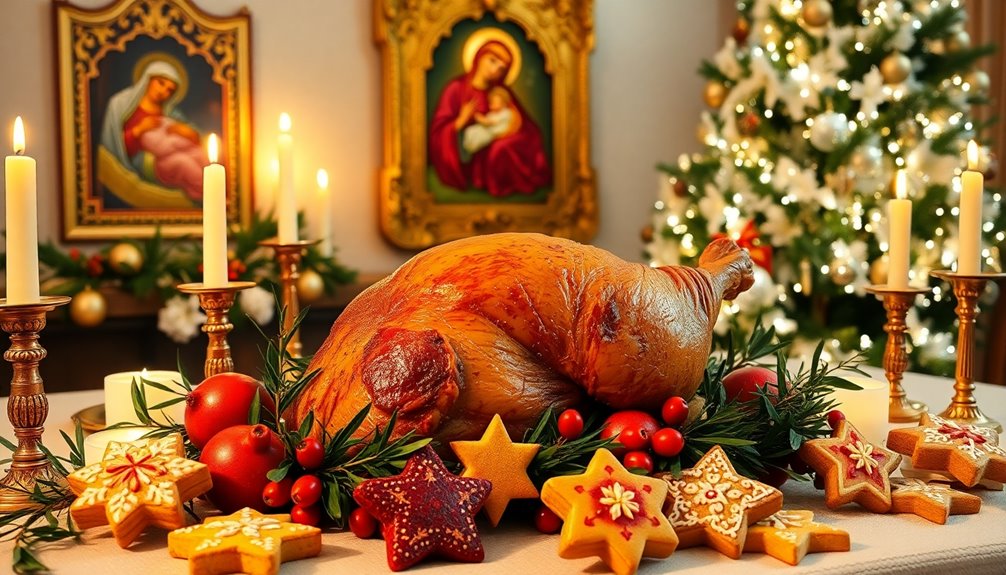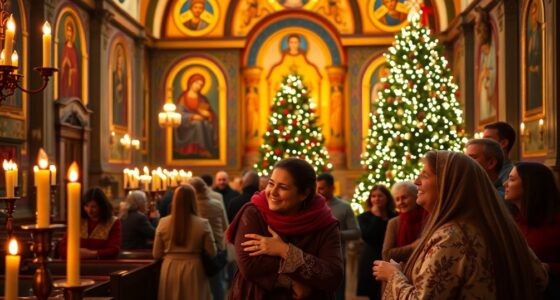Greek Orthodox Christmas celebrations run from December 25 to January 6 and are full of joy and tradition. On Christmas Eve, kids sing Kalanda, collecting treats as they spread cheer through neighborhoods. Families gather on Christmas Day for a festive meal, often with roasted pork or lamb, and enjoy traditional sweets. New Year's Day honors Saint Basil, featuring gift exchanges and the cutting of Vasilopita cake. Each custom brings communities together, inviting you to discover even more about these enriching traditions.
Key Takeaways
- Greek Orthodox Christmas is celebrated from December 25 to January 6, emphasizing community, love, and faith throughout the Dodekaimero period.
- On Christmas Eve, children sing Kalanda (carols) door-to-door, fostering community connections and spreading holiday cheer.
- The festive Christmas Day meal features roasted pork or lamb, accompanied by traditional sweets like melomakarona and kourabiedes, celebrating togetherness.
- New Year's Day honors Saint Basil, involving gift exchanges and cutting the Vasilopita cake, which contains a hidden coin for good luck.
- Decorations include Christmas trees and miniature boats (karavaki), reflecting Greece's maritime culture and enhancing the festive atmosphere.

As you immerse yourself in the vibrant customs of Greek Orthodox Christmas, you'll discover a celebration that not only honors the birth of Christ but also weaves together rich traditions that span from December 25 to January 6, known as Dodekaimero.
This festive season kicks off with Christmas Eve, a time filled with anticipation and joy, as families prepare to celebrate Christmas. On this night, children take part in a cherished tradition: singing the Kalanda, or carols, door-to-door. This joyful practice not only spreads holiday cheer but also allows kids to collect treats and small amounts of money from neighbors, fostering a sense of community and connection.
On Christmas Day, the celebration continues with a festive meal that's sure to delight your taste buds. Families often gather around a table filled with roasted pork or lamb, accompanied by an array of traditional sweets like melomakarona and kourabiedes. These delectable treats mark the end of the Advent fast for many in the Greek Orthodox church, making the meal all the more significant.
As you enjoy the food, you'll appreciate the warmth and love that fills the room, embodying the spirit of the season.
As you get closer to New Year's Day, the excitement builds even more. In Greece, January 1 is dedicated to Agios Vasilis, or Saint Basil, who's celebrated for his generosity and kindness. This day is when gifts are exchanged, adding a layer of festive joy to the celebrations.
One of the most anticipated traditions of this day is the cutting of the Vasilopita cake. This special cake contains a hidden coin, and as each slice is served, there's a delightful sense of suspense. Finding the coin symbolizes good luck for the year ahead, making the experience both delicious and meaningful.
Throughout the Dodekaimero, you'll notice decorations like Christmas trees and miniature boats, known as karavaki. These boats often shine with lights in honor of Saint Nicholas, reflecting Greece's rich maritime culture.
Each element of the celebration, from the singing of the Kalanda to the sweet indulgence of traditional sweets, contributes to a unique and heartfelt experience. As you embrace these customs, you'll find that Greek Orthodox Christmas is much more than a holiday; it's a tapestry of love, faith, and community, filled with cherished memories that last a lifetime.
Frequently Asked Questions
How Do the Greek Orthodox Celebrate Christmas?
You'll find that Greek Orthodox Christmas, or Xristouyenna, is filled with vibrant traditions.
On Christmas Eve, children sing kalanda, visiting homes to bring joy and receive treats.
When you gather for the festive meal, expect roasted pork or lamb alongside sweet delights like melomakarona and kourabiedes.
Gift exchanges occur on New Year's Day, celebrating Agios Vasilis, and you might also see decorations that include both trees and traditional model boats, honoring Greece's rich maritime culture.
Is Orthodox Christmas on January 6 or 7?
Orthodox Christmas is celebrated on January 7. This date corresponds to December 25 in the Julian calendar, which many Eastern Orthodox Christians follow.
While some Greek Orthodox churches use the Revised Julian calendar and celebrate on December 25, the majority stick to the traditional date of January 7.
What Is the Difference Between Christmas and Orthodox Christmas?
Think of Christmas as a tapestry woven from different cultural threads.
The difference between Christmas and Orthodox Christmas lies mainly in the calendar and traditions. While many celebrate on December 25, some Orthodox Christians observe it on January 7 due to the Julian calendar.
The focus also shifts; for Greeks, the Nativity's significance radiates through the festive season until January 6, blending religious observance with unique customs like Vasilopita and kalanda.
What Is the Tradition of Christmas in Greek?
In Greece, Christmas traditions are vibrant and festive.
You'll see families gathering on December 25 to enjoy a hearty meal, often featuring roasted pork or lamb.
Children visit homes singing kalanda, collecting treats or coins in return.
You might notice both Christmas trees and beautifully decorated wooden boats, reflecting the country's maritime heritage.
While gifts aren't exchanged until January 1, the warmth and joy of the season fill the air throughout the celebrations.
Conclusion
As you gather around the table, the warm glow of candles flickers against the cold winter night outside. You savor the rich flavors of festive dishes, contrasting with the simplicity of the Nativity fast. Each carol sung echoes the joy of the season, while the solemnity of the Midnight Mass deepens your connection to tradition. In this blend of celebration and reverence, you find a sense of belonging, bridging the past and present in the heart of your family.









